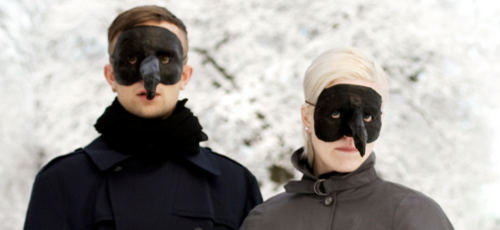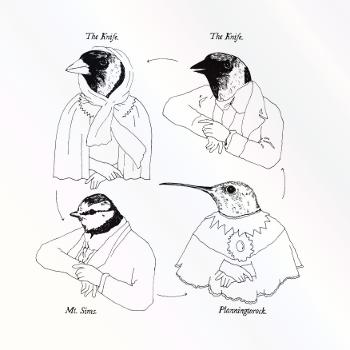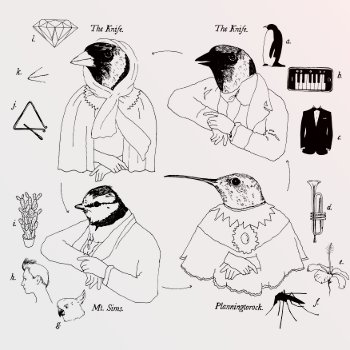The Knife have already proved themselves to be rather more than the average electro duo; from the uncanny beauty of their 2005 odyssey Silent Shout to their rejection of industry awards and penchant for wearing masks in public, the Swedish siblings Olof Dreijer and Karin Dreijer Andersson (a.k.a. Fever Ray) have been keen to push the boundaries of popular music.
It was therefore only a mild surprise to discover that the pair’s latest project was writing the music for an opera about Charles Darwin, to be staged by Danish theatre company Hotel Pro Forma. In Tomorrow, in a Year, which premiered in Copenhagen last September, an opera singer, a pop singer and an actor perform The Knife’s music and represent Darwin, time and nature on stage. Six dancers form the raw material of life.
While the opera now tours various European cities, The Knife have released an augmented version of the score on their own Rabid Records, parts of which were composed in collaboration with Mt. Sims and Planningtorock. Olof Dreijer talks to FACT about the evolution of this unusual project and their new found joy in collaborating with others.
You were initially contacted by Hotel Pro Forma about doing the music for the opera in early 2008. What was it about the project and the concept that attracted you?
“Initially it was more of a performance with music and dance that they wanted to call an opera, and basically focus more on the meaning of the word ‘opera’ meaning just a piece of work. And they wanted to focus on Darwin with a focus on biology and geology, to give an abstract feeling of what evolution could have been like.”
That sounds like quite a daunting proposition to me. How did you approach it and what was the starting point in terms of working on it?
“All the collaborators – us, the lighting designer, the choreographer, and so on – were all given a literature list and lots of notes from Darwin, so there was a lot to read in the beginning. It was really exciting: we started out by making small musical exercises on the theories we read about; it was really quite a direct translation from theory to music. In fact almost every musical choice throughout the whole process has been very conceptual: each sound has come from a theory. That made working on it really difficult but really fun too. I think it’s been really exciting to take his notes, his theory and work with them.”
When did Planningtorock and Mt. Sims get involved in the project?
“We thought quite early on that it would be good to collaborate with them – we knew each other already and I had been thinking it would be great to do something together, so it was a great opportunity to try this. We also thought it was too big a theme to portray with just two brains. I think one way to illustrate this huge diversity you get when you read Darwin was to have different styles and different goals, so that was one reason why we wanted to have them on board. One good thing about working with Mt. Sims, for example, was to do with the lyrics. We were asked to write the libretto in this very Victorian language and it was very difficult to go about that: to avoid making the lyrics too pretentious and find an emotional value in them, a value that was interesting. Mt. Sims’ way of writing was a bit more classical poetry whereas Karin’s is a bit more abstract-contemporary. They also moved in between these areas, but that combination of their different lyric styles was very good and something we wanted to go for.
“We also wanted to have very diverse sounds: one way to approach the word ‘opera’ was to be very creative with the orchestration, something Planningtorock had great experience of, so she and I went to Iceland to record with this percussionist who had a very strange and exciting collection of instruments. We would give him recordings of animals that I had done in the Amazon and let him interpret these recordings and come up with sounds that you didn’t really know if they were animal sounds or electronic sounds or acoustic sounds and try and blur out these separations. So yeah, these different things have been very exciting.”
Was it difficult for you to write for all the different vocalists?
“Yeah, that was really difficult. There was one opera singer [Kristina Wahlin Momme], one pop singer [Jonathan Johansson] and one actress [Laerke Winther] and they had completely different experience of singing, and we had to come up with vocal lines that would fit and we had never written music for any other singer before, so that was really difficult, but also really exciting. We really studied the opera singer a lot: what she was able to do, what sounded good. I had never been to an opera, so we went to one and tried to find different, exciting ways to work with this format. We actually studied more contemporary experimental vocal composers than classical opera to find ways to work with the voice as an instrument and come up with something that would fit into the collage of sound.”
The opera itself lasts 80 minutes, but the album’s 92: what’s different between the two?
“The main difference is onstage all the vocals are sung by these three singers, and on the record we recorded one verse each with Mt. Sims and Planningtorock and Karin to kind of point out how this piece can be sung by different singers in the future: it’s a piece that can appear in different versions. Then we kind of worked more on the production, more exciting vocal sounds, and some of the songs are longer on the record as well, because they were cut in the performed version. But apart from this it’s pretty much the same, although in the performed version it’s surround sound here and there and on the record it’s stereo.”
“We were asked to give a personal touch and also to try to imagine Darwin’s internal psychology”
One of the key tracks from Tomorrow, in a Year seems to be ‘Annie’s Box’ – a song about the death of Darwin’s 10-year old daughter. Rightly or wrongly there is this idea that scientists are quite aloof from the world whereas Darwin was very much a family man, so was there an idea to show his human side with that song?
“We were asked to give a personal touch and also to try to imagine Darwin’s internal psychology. ‘Ebb Tide Explorer’ is one of the tracks that goes into this – he had gained a knowledge that in the beginning he didn’t want to take in because he had a religious background. He was seeing all these proofs in the world, seeing that what he had learned was wrong so this kind of internal struggle must have been quite strong.
“’Annie’s Box’ was also an attempt to show his personal side. He seems to have been quite a caring father for his time: he wrote very nice words about his kids and he would involve them in his process and he also wrote very emotional words about the death of his daughter Annie.”
You’re releasing the album under a Creative Commons license. What’s the thinking behind that?
“That’s like an attempt to show that this piece is really a kind of musical exercise, a study of others’ work: we have studied all this Darwin and all this literature and also studied earlier music for modern dance. I think any study, or research if you want to call it that, should be shared and not copyrighted. Another reason is to encourage creative listening rather than ‘illegalise’ any people who choose to be creative with the music.”
The opera, as well as its premiere in Denmark, has also been performed in Greece and Sweden, and it’s going to Germany in June. Given the subject matter, I would say the place it most needs to be heard is the US. Are there any plans to take it over there or is that not going to happen?
“I don’t really know actually: it’s a bit out of my hands. They are talking about different places here and there and one of Hotel Pro Forma’s earlier pieces from the 90s is still running, so it seems like they can go on sporadically over some years.”
I presume you were at the premiere in Copenhagen: how you feel seeing the opera?
“The fact that we worked on the music for one-and-a-half years but it was brought together with the other parts of the piece only three months before the premiere made for quite an exciting process. But because of this long process for us with the music we had developed our own images in our minds and they were very different from what we saw on stage. It was really interesting to see what the other people did, for example, the choreographer hadn’t heard our music until maybe two months before the performance, so everything was done very separately – it is many shows going on at the same time on stage.
“Someone else’s understanding of the music and how they choose to see it is really interesting. I like when things are very open to interpretation, that’s why we want to release the record like this, with the black and white cover, and let people create their own show with it.”
What have you learned from working with the opera company and Matt [Mt. Sims] and Janine [Planningtorock] that you would like to incorporate into your next recordings or your live presentation?
“I learned a lot and I think that the collaboration between me, Karin, Janine and Matt has been really, really great: it has made the most exciting music in the piece. Just coming up with an interesting process has been really exciting, and I’m happy to continue in different collaborations, that’s really the learning thing here.”
So, what’s next for The Knife?
“I don’t know really. I’m studying at university now this half year – Gender Studies. We are putting out this release as we have our own label and then just taking it easy and we’ll see what’s next. I have many different projects and The Knife is a project that when we decide to work together we go into a kind of intense process – so, we’ll see when that will be.”
Justin Toland





















